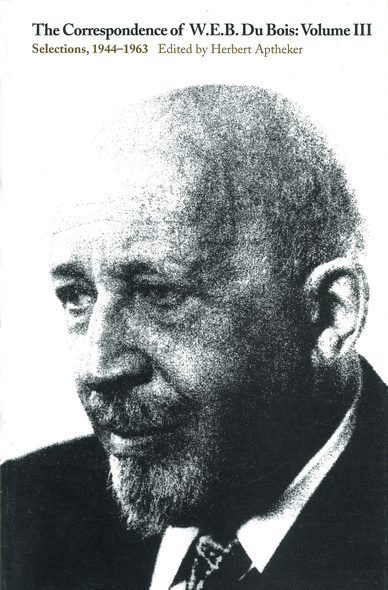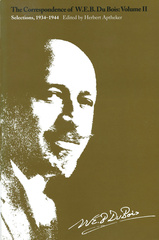The Correspondence of W.E.B. Du Bois, Volume III
Selections, 1944–1963
By W.E.B. Du Bois; Edited by Herbert Aptheker
SERIES:
Correspondence of W.E.B. Du Bois
University of Massachusetts Press
Scholar, author, editor, teacher, reformer, and civil rights leader, W.E.B. Du Bois (1868-1963) was a major figure in American life and one of the earliest proponents of equality for black Americans. He was a founder and leader of the Niagara Movement, the NAACP, and the Pan-African Movement; a progenitor of the 1920s Harlem Renaissance; an advocate of anticolonialism, anti-imperialism, unionism, and equality for women; and a champion of the rights of oppressed people around the world.
The three-volume Correspondence of W.E.B. Du Bois offers a unique perspective on Du Bois's experiences and views. In recognition of the significance of the Correspondence, the final volume was named a Best Book of the Year by the New York Times Book Review.
Herbert Aptheker has provided an introduction and notes to each volume, illuminating the circumstances and identifying the personalities involved in the correspondence. A long time friend and colleague of Du Bois, Aptheker is a well-known historian of the African American experience. In 1939 and again in 1969, he won the history award given by the Association for the Study of Negro Life and History. Among his most prominent works are American Negro Slave Revolts and the three-volume Documentary History of the Negro People in the United States.
The three-volume Correspondence of W.E.B. Du Bois offers a unique perspective on Du Bois's experiences and views. In recognition of the significance of the Correspondence, the final volume was named a Best Book of the Year by the New York Times Book Review.
Herbert Aptheker has provided an introduction and notes to each volume, illuminating the circumstances and identifying the personalities involved in the correspondence. A long time friend and colleague of Du Bois, Aptheker is a well-known historian of the African American experience. In 1939 and again in 1969, he won the history award given by the Association for the Study of Negro Life and History. Among his most prominent works are American Negro Slave Revolts and the three-volume Documentary History of the Negro People in the United States.
An excellent job of editing. . . . There is not an editorial comment nor an editorial footnote that is superfluous. There is not a single letter nor an exchange of letters that does not contribute to the reader's understanding of Du Bois himself or of the history of the times through which Du Bois lived and upon which he had a very considerable effect.'—Jay Saunders Redding, Phylon
'Du Bois's long life and committed scholarship were devoted to a belief in the ultimate realization of one world free of racial or ethnic division and strife, economic exploitation and inequity, capable of unlimited intellectual, scientific and technological development for the benefit of humankind.'—David Graham Du Bois
'It is a remarkable fact that this volume brings to completion the first collection of the correspondence of any black American. As such, it is a milestone in the coming of age of Afro-American history, a subject whose scholarly acceptance is among W.E.B. Du Bois's most outstanding legacies.'—New York Times Book Review
W.E.B. Du Bois was a critic, editor, scholar, author, and civil rights leader. Herbert Aptheker was a colleague of Du Bois's and a historian of the Afro-American experience.











